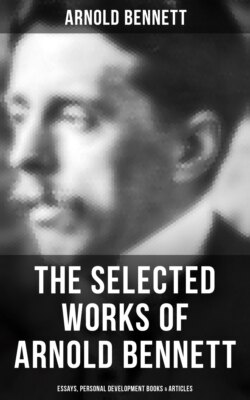Читать книгу The Selected Works of Arnold Bennett: Essays, Personal Development Books & Articles - Arnold Bennett - Страница 61
На сайте Литреса книга снята с продажи.
The Magazine Short Story.
ОглавлениеWhen the aspirant has accomplished a few very short stories with a certain amount of satisfaction and of profit to himself, he may attempt a more elaborate form. The average short story of the monthly magazines and the sixpenny weeklies varies from four to six thousand words; five thousand words is probably the mean—a length which gives ample scope for the display of literary ingenuities of all sorts. In the following magazines a melodramatic or strikingly humorous plot is essential, and the literary standard is a popular one: Pearson’s, Strand, Windsor, Royal, Harmsworth's. The Pall Mall Magazine and the sixpenny weeklies print stories of all standards and kinds of plot The readers of Comhill, Blackwoods, Longman’s, and Macmillan's are more refined and exacting in their tastes; while not objecting to a melodramatic plot, they like also stories of domestic quietude and social observation; and in any case they demand at least a colourable imitation of style. Blackwood's, in my opinion, still marks the summit of literary distinction, and the writer who is good enough for Blackwood’s is destined for success. The other end of the scale, in a purely literary sense, is reached in some of the ladies’ monthlies.
The aspirant will do well to aim at the most popular magazines. Though their editors are extremely exigent, their conditions are perhaps less difficult to satisfy than those laid down in magazines appealing to a smaller audience. Other things being equal, it is easier, I am convinced, to write a crudely effective, ingenious, “breezy” story of crime or mystery for the Strand than a quiet naturalistic study of social manners for Comhill. In the popular magazines ingenuity of plot is almost everything, and a mere beginner may in a happy moment hit on a notion that will “sell itself.”
The advice which I have already given as to writing very short stories applies to larger stories, and indeed to all fiction. In the very short story limitations of space compel even the beginner to confine himself strictly to the telling of the story. But with five thousand words at his disposal the beginner may fall into the common error of interrupting the action of his tale by passages which please him personally but which in reality are digressions. He should therefore examine his more elaborate work with a particular care. He should say to every paragraph, every incident: “Do you help the story along? Are you absolutely necessary to its progress and effectiveness? If not, out you go, no matter how fine you look!” He should beware of long explanatory passages. Should these seem to him dull and heavy, he must either forcibly enliven them by humour or other device, or he must cut them out and invent action to do their work. Every part of the story must be interesting, must titillate or give a fillip to the reader’s curiosity and pleasure. Every sentence must inspire the reader with a wish to read the next sentence. This is “readableness,” and the quality of “readableness” can only be obtained by constant effort, by a tireless intention to make the story “go” at any cost.
With regard to models for the five-thousand-word story, they exist in plenty. But some of the very best short-story writers make bad models, either because the beginner is likely to mistake their faults for their excellences, or because their methods and their effects are so peculiar to themselves, so individual and defiant of analysis, as to bewilder instead of assisting the student of them. Four of the finest living short-story writers are Mr. Joseph Conrad, Mr. W. W. Jacobs, Mr. Rudyard Kipling, and Mr. Eden Phillpotts. But I would bring forward none of them as models. On the other hand, “Q” (Noughts and Crosses, &c.), Mr. Arthur Morrison (Tales of Mean Streets), Mr. H. D. Lowry (Wreckers and Methodists), and Messrs. Wells and Gilchrist, whom I have previously recommended, ought to be of considerable use to the intelligent student Of strictly popular writers, the cleverest and most workmanlike are Mr. Max Pemberton and Mr. E. Phillips Oppenheim. And if the aspirant is desirous of becoming a pillar of the popular magazines, he should ponder upon the works of these writers.
The demand for magazine stories is good, and of course it remains quite unaffected by the vicissitudes of trade, the rumours of war, and the preoccupation of politics. Last autumn I obtained some statistics from the editors of well-known magazines as to the number of short stories which they consumed in the course of a year. The figures were:—
| Strand Magazine | . . . | 62 |
| Pall Mall Magazine | . . . | 63 |
| Pearson's Magazine | . . . | 67 |
| Harpers Magazine | . . . | 88 |
The fiction-manager of Messrs. Tillotson’s syndicate informed me that he bought annually about two hundred short stories of various lengths.
The remuneration offered by the principal magazines varies from good to generous. Periodicals such as Pearson’s, Strand, and Windsor will pay as much as fifteen guineas to an unknown writer for a five-thousand-word story. - Cormhill pays a guinea a page, which is slightly less. The Pall Mall Magazine does not care to pay more than two pounds a thousand. The threepenny magazines can be induced to give thirty shillings a thousand. The aspirant should walk warily into the webs of magazines which have outlived their reputations or have never acquired a reputation. I know of one magazine with an ancient name whose fixed price for short stories is half a guinea—not per thousand words, but per story.
